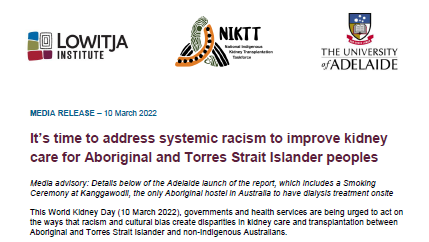It’s time to address systemic racism to improve kidney care for Aboriginal and Torres Strait Islander peoples

It’s time to address systemic racism to improve kidney care for Aboriginal and Torres Strait Islander peoples
Media advisory: Details below of the Adelaide launch of the report, which includes a Smoking Ceremony at Kanggawodli, the only Aboriginal hostel in Australia to have dialysis treatment onsite
This World Kidney Day (10 March 2022), governments and health services are being urged to act on the ways that racism and cultural bias create disparities in kidney care and transplantation between Aboriginal and Torres Strait Islander and non-Indigenous Australians.
Lowitja Institute and the University of Adelaide today released the Cultural Bias and Indigenous Kidney Care and Kidney Transplantation Report, prepared for the National Indigenous Kidney Transplantation Taskforce (NIKTT). The report details ways to improve kidney transplantation rates and care for Aboriginal and Torres Strait Islander peoples through addressing key barriers that lead to culturally biased care.
This report centres the voices of Aboriginal and Torres Strait Islander people with lived experience of kidney disease, using their knowledge and understandings to guide the recommendations put forward. “We know that institutional racism and systemic bias are barriers to kidney transplantation and affect Aboriginal and Torres Strait Islander peoples across the health system,” said Kelli Owen, a proud Kaurna, Narungga, and Ngarrindjeri woman, kidney transplant recipient, and kidney health researcher. “We have the answers to help keep our mob healthy and provide culturally safe kidney care. We just need them to be applied,” Ms Owen said.
Ms Owen, Community Engagement Coordinator for NIKTT, said Aboriginal and Torres Strait Islander people are significantly more likely to experience kidney failure compared to other Australians while also being diagnosed at earlier ages. Despite this, they are four times less likely to receive a kidney transplant when they need it.
“The report lays out 14 clear recommendations to ensure culturally safe, respectful, and co-designed kidney services for Aboriginal and Torres Strait Islander peoples that will go a huge way towards improving kidney care for our peoples and to Close the Gap on wider health inequities,” she said.
Ms Owen travelled across Australia, from the Kimberley to Goulburn Valley, to meet with Aboriginal and Torres Strait Islander patients, families, health professionals, and community members, whose experiences and insights have shaped the report’s findings and recommendations across four key domains:
Inclusion of Aboriginal and Torres Strait Islander people at all levels of kidney care.
- Creating a culturally safe workforce and valuing the Aboriginal and Torres Strait Islander workforce.
- Enhancing service delivery and models of care.
- Improving structures and policies in kidney care.
The recommendations include the establishment of Indigenous Reference Groups in every transplantation unit across Australia, as well as building the Aboriginal and Torres Strait Islander kidney health workforce to include specialised clinical roles such as Aboriginal regional transplant care coordinators and sustainable kidney patient navigator/peer support roles.
“Our work at Lowitja Institute over many years has shown that culture is a protective factor for Aboriginal and Torres Strait Islander health and wellbeing and needs to be integrated within health policy frameworks and service delivery,” said Lowitja Institute CEO Adjunct Professor Janine Mohamed.
“The report underlines how racism in the health system manifests in various ways through institutional and organisational systems and implicit and explicit bias from health professionals, and its direct impact on clinical care.”
“We need a culturally safe health system so that our people experience a sense of belonging and wellbeing within health care settings and access to the best care when we need it most,” Dr Mohamed said.
“Kidney transplantation is the best treatment for severe kidney failure and community have clearly and consistently said they want transplantation to allow them to return home. Yet we have systems that effectively disadvantage and exclude some groups of people and we need to change our models of care to address this,” said Professor Stephen McDonald, a kidney specialist in Adelaide and Chair of the NIKTT.
“The recommendations laid out in this report are an important step in this. Involvement of Aboriginal and Torres Strait Islander people in co-designing these care pathways will be critical.”
“As health professionals, we will need to institute and sustain initiatives that address racism and cultural bias in health care and build on the strong examples of culturally safe care outlined in the report.”
Yet even the NIKTT, which was established in July 2019 to improve access to kidney transplants for Aboriginal and Torres Strait Islander peoples, is already facing uncertainty, with its funding not assured beyond 30 June 2022.
“Resourcing for the NIKTT needs to continue so our work can continue and expand,” Ms Owen said.
Cultural Bias and Indigenous Kidney Care and Kidney Transplantation Report

